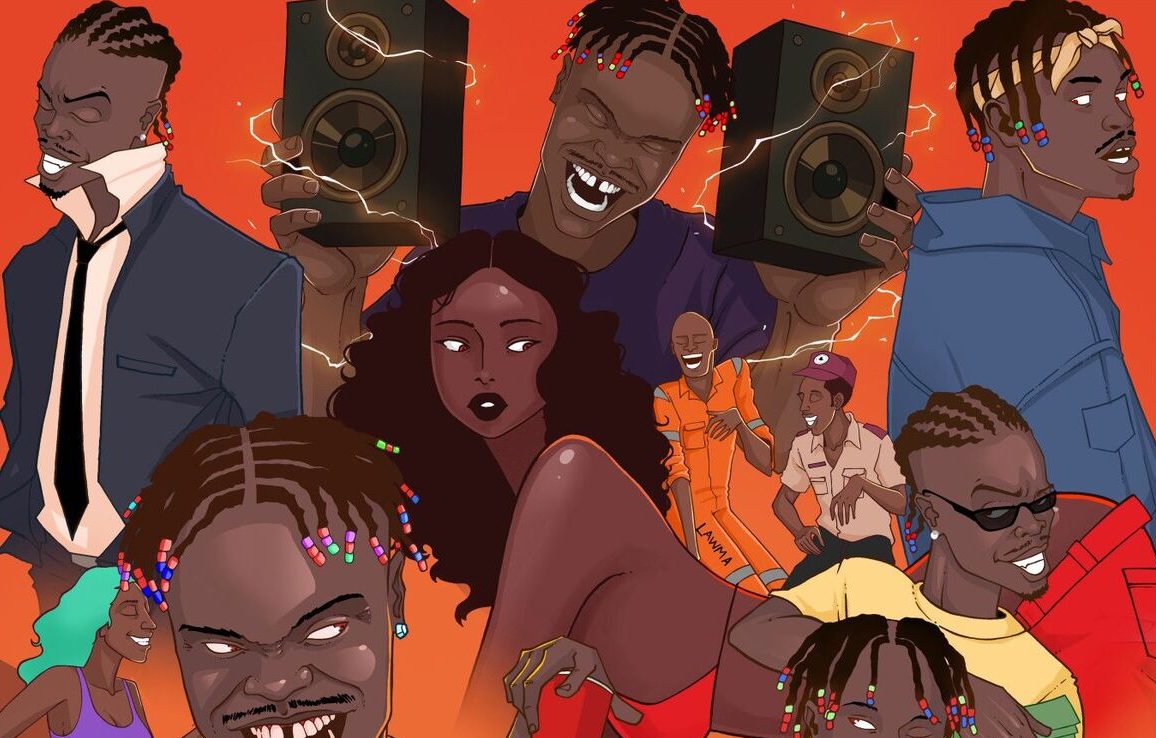Wa Jo Pa is a solid follow-up that does exactly what a second album should: it solidifies Bad Boy Timz’s identity, refines his strong points, and hints at his next level.
By Yinoluwa Olowofoyeku
Bad Boy Timz, born Olorunyomi Oloruntimilehin on August 13, 1999, in Lagos, Nigeria, is fast becoming a dynamic force in the Afrobeats scene. His musical journey began in 2019 with viral skits and freestyles that captured the attention of industry heavyweights like J Hus.
This early buzz led to a deal with Anonymous Music, setting the stage for his breakout Timz EP. The release of “MJ” in 2020, along with its remixes featuring Mayorkun and Teni, catapulted him into the limelight, showcasing his knack for infectious hooks and danceable rhythms. His collaboration with Olamide on “Loading” further cemented his status, earning him the Rookie of the Year award at The Headies in 2020.
Despite his rising fame, Timz faced challenges—most notably a public dispute with his former label, Anonymous Music, over contractual disagreements and alleged wrongful detention. This prompted him to establish his own label, Shock Absorbers Music, in 2021, marking a new chapter of independence in his career.
Balancing his burgeoning music career with academics, he graduated from Bells University of Technology with a degree in Computer Engineering in 2020.
His discography reflects a blend of Afrobeats and Street-Hop influences, evident in tracks like “Have Fun”, “Move”, and “Skelele”. Timz laid the groundwork for his musical style, which he expanded upon in his 2023 album, No Bad Boy, No Party. Now, with the release of his second album, Wa Jo Pa, Bad Boy Timz aims to evolve, delivering a vibrant collection that underscores his growth as an artiste.
The opening track, “Yo-Yo”, immediately sets the tone for Wa Jo Pa with a rhythmic, percussion-heavy Amapiano base, made distinct by rattling shakers, heavily filtered bass synths, and airy pads that cushion the verse sections.
Smooth Rhodes chords lend a silky texture to the quieter moments, but it’s the inventive log drum programming that brings the song to life—first as an accent to the chorus’ group vocal chants of “Yo-Yo”, and later as the main event in a sliding, heavily effected tirade that plays almost like an instrumental solo.

Lyrically, Bad Boy Timz flits between English and Yoruba as he paints quick vignettes of life’s turbulence and change. The theme isn’t so much narrated as it is illustrated through scattered life circumstances, and it’s that sketchbook energy that makes it a strong opener.
Released prior to the album, “Say Wetin” is a compact, punchy single that thrives on wit and bounce. Amapiano again takes the lead with shakers and rolling log drums, but it’s the staccato synth hits and clipped chords that give the track its pace and playful tension.
Timz leans fully into his comedic sensibilities here, detailing the letdowns of everyday interactions with a sly grin and sing-along flair. “God damn it, the matter don dey spoil my mood/ Middle man no pick/ Exchanger say e sick/ Papilo no worry one day you go still reach your peak”, he sings with effortless charm. With “You say wetin?” repeated as a taunting refrain, the song’s hook is infectious, proving Bad Boy Timz’s ability to make simple concepts stick.
“Only You” slows things down just a touch, swapping out the cheeky chaos of earlier tracks for a more emotive tone. Expressive piano chords and a lush bassline are paired with uncomplicated Afro-Swing drums, until the latter half introduces the now-familiar Amapiano log drums and snare rolls to punctuate the emotional peak.
It’s a classic love song with just enough bite; Timz doesn’t write with a poet’s pen, but his streetwise phrasing and well-paced delivery carry the sentiment. There’s something charismatic in how plainly he offers his affection—never overplaying the emotion, but keeping the song warm and kinetic from start to finish.
“Mad Riddim” ups the energy with bright piano chords and bouncing arpeggiated synths layered over rolling bass and minimalist percussion. It’s a classic Bad Boy Timz concoction, boasting nimble Afro-Adura delivery that ping-pongs between song and speech, laid over a playful, call-and-response-style beat.
He spends the runtime spinning in the giddy disorientation of new love, admitting he’s lost in it, though the lyrical depth barely grazes the surface. Still, it works—because the instrumental does as much talking as Timz does, and the dynamic interplay between vocal and beat becomes the crux of the song.
One of the more personal cuts on Wa Jo Pa arrives with “Therapy”, where Timz sings, “I dey carry person along but ko tele mi/ I dey feel alone even around family/ Everyday on kpoli, I just commot from therapy.” The production—an Amapiano-Afrobeats blend with neatly arranged percussion and subdued chord stabs—mirrors the introspection, keeping things tidy until a burst of rolling snares escalates the mood.
It’s a strong showing of vulnerability from Bad Boy Timz, one that hints at pain without dwelling too long on it. An odd falsetto moment during the bridge swings for left-field expression but doesn’t quite land, though its presence is a welcome attempt at sonic variation.
“Big Engine” is more of a flirtatious dance floor detour, driven by steady shakers and deep toms, with a thick bassline and glimmering synths lending a sense of nighttime atmosphere. Timz marvels at a woman’s “small body, big engine” and then mostly lets the beat take the wheel.

He rides the instrumental with instinctive rhythm, never overcomplicating the concept or delivery. There’s not much going on lyrically, but the synergy between his vocal pattern and the instrumentation ensures it never drags. It’s one of those tracks built more for movement than message—and in that lane, it succeeds.
“Later” follows with a similarly energetic bounce. Previously released as a single, it’s a firm bye-bye to bad vibes, delivered over thumping Afro-Piano drums, a punchy bassline, and bright synth chord stabs that evoke the sunny feel of a summer house cut.
“Nobody talking your matter then you are nobody/ Gbeborun ati alaroka ni bestie/ Bad energy needs company”, he warns, in a mix of Yoruba and English. The ad-libs and backing vocals do a lot of the heavy lifting here, adding dimension to Bad Boy Timz’s consistent and engaging lead vocal. Like “Big Engine”, it’s more about the groove than lyrical depth—but that groove is impossible to ignore.
Wa Jo Pa closes with “Grateful”, a standout that eschews the Amapiano scaffolding entirely and instantly feels more emotionally grounded. Smooth, soulful chords sit alongside gentle brass licks, light percussion, and a subtle bass groove to build one of the richest instrumentals on the project. Timz’s delivery is soft and sincere, his melodic storytelling matching the elegance of the instrumental.
“I’m grateful/ Too grateful/ To be ungrateful”, he remarks. His recounting of past struggles is framed not as trauma but as contrast, set against the joys of the present. Whether it’s the structure, the subject, or the singing, something about this track feels more refined, mature, and composed than the others around it. As a closer, it’s a fitting full-circle moment that gives the album its most grounded emotional resonance.
Wa Jo Pa reveals not just a deepening sense of self but a sharpening of Bad Boy Timz’s artistic instincts. The project doesn’t aim to reinvent him; instead, it doubles down on what he does best. Timz plays to his strengths: witty lyricism, spirited vocal delivery, and a knack for squeezing punchy perspective into lean phrases.
He’s not interested in virtuoso singing or rhythmic precision—rather, he embraces the expressive elasticity of Street-Hop and Afro-Adura, letting feeling and phrasing take the wheel.
Songs like “Say Wetin” and “Later” see him riding the bounce of each beat with agility, relying on cadence and energy to make his words stick, while peppering his vocal lines with sharp ad-libs and textured group vocals to break up the flow and add emphasis. But he also gestures at a more tender, refined side on “Grateful”, offering a moment of introspection that shows there’s more range to his artistry than meets the eye.
The production across Wa Jo Pa echoes that same balance—vibrant, energetic, and just playful enough to feel alive. Most tracks are rooted in the Afrobeat-Amapiano fusion that defines the current Street-Hop soundscape, but the project never lets that mould become a constraint.
The log drum solos on “Yo-Yo” and the rhythmic elasticity of “Mad Riddim” showcase the producers’ willingness to experiment within the familiar. The instrumentals don’t just support Timz; they co-star with him, offering bounce, texture, and moments of unexpected flair.

“Grateful”, again, stands out for its richer, more layered Afrobeat instrumental, offering a different palette and showing how compelling Bad Boy Timz can be when he steps outside his usual framework. The engineering gives everything its place. Vocals punch through when needed, and the beat gets its turn to shine when it’s time to move.
All in all, Wa Jo Pa is a solid follow-up that does exactly what a second album should: it solidifies Bad Boy Timz’s identity, refines his strong points, and hints at his next level. There are no features here, but that’s no shortcoming. Timz handles the load himself and does so by making deliberate, smart decisions about his sound and delivery.
It’s a project that doesn’t try to be more than it needs to be but still manages to point toward something more. It shows exactly who Bad Boy Timz is and what more he could become if he continues to push the edges of what he already does so well. Wa Jo Pa is proof that Bad Boy Timz knows how to thrill, and that he’s only just begun to grow.
Lyricism – 1.3
Tracklisting – 1.4
Sound Engineering – 1.5
Vocalisation – 1.4
Listening Experience – 1.4
Rating – 7/10
Yinoluwa “Yinoluu” Olowofoyeku is a multi-disciplinary artist and creative who finds expression in various media. His music can be found across all platforms and he welcomes interaction on his social media @Yinoluu.




